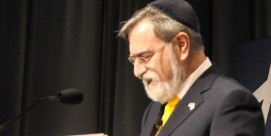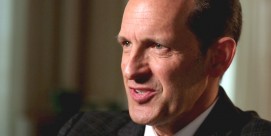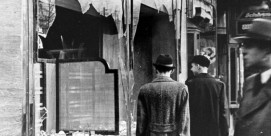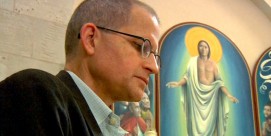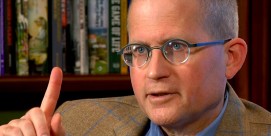In This Episode << SLIDE LEFT TO SEE ADDITIONAL SEGMENTS
Bonhoeffer for the Twenty-first Century
by Robin W. Lovin
Foremost among the theological influences on Dietrich Bonhoeffer’s generation was the development of the Confessing Church. German Protestant Christianity was not a particularly likely place for resistance to develop. There was a traditional Protestant deference to secular authority — the enthusiastic nationalism of the old Prussian “union of throne and altar” — along with the lack of a natural law understanding of the world that could provide a critique of tyranny in moral terms. Nevertheless, for Bonhoeffer and his contemporaries the church was the place where their resistance started. The key to their thinking was the idea of a church that would be faithful to the historic Reformation confessions and resist the incursions of Nazi organization and ideology.
In 1934, a gathering of Protestant pastors, led primarily by Karl Barth, met in the German city of Barmen and announced that they were organizing themselves as a Confessing Church, outside the framework of the state churches Hitler was trying to control. For them, they declared, this was not a matter of creating a new church. They were the true church of the Reformation.

Bonhoeffer was not present at the Barmen gathering, but he quickly became one of its younger leaders, and he spent most of the rest of the decade of the 1930s as director of a Confessing Church seminary, operating under increasing scrutiny and constraint by the Nazi authorities. It is to this period that we owe two of his most accessible and popular works, LIFE TOGETHER and PRAYERBOOK OF THE BIBLE.
The Confessing Church maintained a courageous resistance to Hitler’s decree that every German institution had to reorganize itself in conformity with National Socialist policies. Simply by its continued presence, the church defied the ideology that every person and every institution exists to serve the nation at the command of the Fuehrer. “The Body of Christ takes up space on earth,” as Bonhoeffer put it in THE COST OF DISCIPLESHIP. “That is a consequence of the Incarnation.”
In Bonhoeffer’s context, insisting that the church takes up space was a political statement, susceptible to interpretation along classical Lutheran lines in which the secular ruler is entitled to obedience in everything except matters of faith, which may be interpreted in such a way that they take up very little space, indeed. By 1938, most Confessing Church pastors had taken some form of loyalty oath to Hitler.
Bonhoeffer remained a loyal pastor in the Confessing Church through the years leading up to the war and, indeed, through his participation in the conspiracy against Hitler and his arrest and imprisonment. But he was increasingly clear that the Confessing Church’s stance was not sufficient to answer all of the questions he was facing in his own life. He struggled with ideas of Christian pacifism and Gandhi’s nonviolence. He considered the possibility of exile, returning to his teaching career in the safety of an American seminary. In the end, as we know, he became a part of a conspiracy against Hitler at the highest levels of the German government, using his role as a civilian agent in military intelligence as a cover for ecumenical connections that allowed the conspirators to make tentative contacts about a peace settlement with the British government.
It is clear from his actions as well as his writings that for Bonhoeffer himself, purity of witness was no longer the primary criterion of faithful discipleship. What he calls responsible action, with a willingness to risk guilt in the course of it, becomes the test of Christian action for him personally. “Who stands fast?” Bonhoeffer asked in an essay he wrote for several of his fellow conspirators at the end of 1942. “Only the one for whom neither reason, nor principles, nor conscience, nor freedom, nor virtue is the final measure, but who offers all this, when called in faith and in sole allegiance to God to obedient and responsible action.”
We know what course Bonhoeffer himself took in the extremes of risk and opportunity that he faced, but it is not altogether clear how he understood the Christian responsibility generally. Is responsibility something that arises at the extreme edges of life, in rare cases like his, where the opportunity of effective resistance to tyranny presents itself? Or is it something that is part of the structure of Christian life every day — in ordinary times as well as extraordinary, perhaps even more in ordinary times than in the extreme situations?
Bonhoeffer’s ETHICS is the closest thing we will ever have to his own answer to that question. He began writing it in 1940, as the war finally ended his work with the Confessing Church seminarians and he began his role with German military intelligence. The work he completed was done in moments of reflection between his ecumenical contacts and his work for the Confessing Church, sometimes on the country estates of friends and family, sometimes at a Benedictine monastery in Bavaria, sometimes in Berlin.
Eberhard Bethge’s preface to the first edition of Dietrich Bonhoeffer’s ETHICS begins with the disclaimer, “This book is not the ETHICS which Dietrich Bonhoeffer intended to have published.” ETHICS is not the book Bonhoeffer wanted to have published because it is not really the draft of a book at all. What Bonhoeffer left were 13 manuscripts that he presumably intended to use in the book and 115 scraps of paper with outlines or ideas he jotted down while working.
The editors of the critical German edition of ETHICS, which provides the basis for a new English translation edited by Clifford Green and published by Augsburg Fortress, wisely abandoned guesswork about what Bonhoeffer would have done in favor of meticulous reconstruction of what he actually did. The published German text was carefully corrected against the original manuscripts, ink and paper were traced back to their sources, and material in the manuscripts was correlated to references in diaries and letters to produce a detailed account of when and where Bonhoeffer produced the manuscripts we have left. These are presented in the order he wrote them, with notes that connect the text to the scraps of paper he left, to the books he was reading, the places he was working, and the other things that were happening in his world at the time. As a result, the text of ETHICS, which taken by itself is often opaque, becomes in this new presentation almost biographical. We understand Bonhoeffer’s theology better because we see more clearly what he was reflecting on in his own life.
The conspiracy certainly is one dominant theme in this biographical reading of the ETHICS. As Clifford Green observes, “The book is unique in being the only ethic written by a Lutheran theologian while engaged in a conspiracy to topple a tyrant.”
While Bonhoeffer could hardly carry around notebooks that addressed the ethics of tyrannicide directly, some of the early pages of his work contrast the figure of Christ, who loves humanity and is despised for it, with the tyrant who despises humanity and is idolized by the people nonetheless. Bonhoeffer struggles here with his own temptation to view the German people with the same contempt Hitler has for them. “Only because God became human is it possible to know and not despise real human beings,” he writes. We begin to learn some things about responsible action that take it out of the realm of the elite and returns it to the realm of actions ordinary Christians might undertake. First, responsible action must be undertaken on behalf of real human beings whom God has loved, not to vindicate one’s own superiority, righteousness, or wisdom.
That is the idea behind the initially puzzling concept that earlier editions of ETHICS translated as “deputyship,” rendered in the new English version as “vicarious representative action.” The phrase is less elegant than the German “Stellvertretung,” but it is exactly right, and it has the advantage that it calls our attention to the fact that this Christological idea runs through Bonhoeffer’s theology as a whole, from his first published work to the late manuscripts of ETHICS. The variety of previous English translations made it all but impossible for English readers to spot this continuity in Bonhoeffer’s thought. The use of a standard vocabulary for translation in all volumes of the new Dietrich Bonhoeffer Works largely solves that problem. Responsible action now gains some theological depth. It is not simply a grand gesture by a responsible person, nor a paternalistic service offered by one who happens to be well-placed enough to do for others what they cannot do for themselves. It is a true imitation of Christ, a willingness to be despised and abused for the sake of those who have themselves been despised.
It is impossible to read the new edition of ETHICS without being deeply impressed by Bonhoeffer’s moral clarity about what he was doing in the conspiracy and by the depth of his understanding of where it was likely to lead. Readiness for death speaks from every page of the manuscript “Ethics as Formation,” not as an act of personal courage, but as a theological affirmation.
But here the question about relevance to our situation emerges in a new way. The church needs the courage to be in the catacombs, but that is not the only place it has to be. A popular reading of Bonhoeffer is to see him affirming a kind of separation of the church from the world. That the church takes up space means we must create our own space. We witness most clearly when we do that. We confuse people when we mix it up with the world.
But we do not live in Hitler’s Germany, where no one was allowed to take up space except on Nazi terms. We live in a world where the ideology is take all the space you want, or at least all the space you can get, or all the space you can buy. Can an ETHICS that is about witnessing to a world that wants to control the church be relevant to people who live in an age when the world wants to ignore it? To answer that question, we have to look beyond the parts of the ETHICS that are a commentary on the conspiracy to see the larger world Bonhoeffer envisioned. ETHICS is above all a book about new life. Bonhoeffer returned to Germany in 1939 not because he wanted to die but because he wanted to participate in the renewal of German life after the war. In very large parts of ETHICS, it seems that his sights are set not on whether we will live through this time but on how we will live after it.
Crucial to that question is his evaluation that Hitler and the Nazis were not the cause of the world’s problems in his time. They were a symptom of a deeper problem in the modern world or, more precisely, they became powerful by exploiting that deeper problem. It is not Nazi ideology that is the source of the problem, but the moral bankruptcy that made the Nazis possible. And the church cannot address the world simply by opposing the Nazis. It has to address the deeper, underlying problem in solidarity with those ordinary people whom the Nazis exploited and secretly despised.
The idea of responsible action, then, has less to do with heroic resistance to tyranny than with a response to the conditions that made tyranny possible. Those conditions, as Bonhoeffer describes them, may seem strikingly familiar to us, because what he worries about most of all is a people who have lost their sense of the past and so cannot possibly have a meaningful future:
Nothing is fixed, and nothing holds us. The film, vanishing from memory as soon as it ends, symbolizes the profound amnesia of our time. Events of world-historical significance, along with the most terrible crimes, leave no trace behind in the forgetful soul. One gambles with the future. Lotteries and gambling, which consume an inconceivable amount of money and often the daily bread of the worker, seek the improbable chance of luck in the future. The loss of past and future leaves life vacillating between the most brutish enjoyment of the moment and adventurous risk taking. Every inner development, every process of slow maturing in personal and vocational life, is abruptly broken off. There is no personal destiny and therefore no personal dignity. Serious tensions, inwardly necessary times of waiting, are not endured. This is evident in the domain of work as well as in erotic life. Lasting pain is more feared than death. The value of suffering as the forming of life through the threat of death is disregarded, even ridiculed. The alternatives are health or death. What is quiet, lasting, and essential is discarded as worthless. “Great convictions” and the search for one’s own way are replaced by a frivolous sailing with the wind. In the political sphere, taking ruthless advantage of the moment is labeled Machiavellianism, and betting the bank is called heroic, a free action. What is neither Machiavellian nor heroic can be understood only as “hypocrisy” by those who no longer comprehend the slow, hard struggle between knowing what is right and what is necessary at the time, that is, that kind of genuine Western politics, which is full of compromises and of really free responsibility. So strength is disastrously confused with weakness, loyalty to history with decadence. Because there is nothing that lasts, the foundation of historical life — trust in all its forms — is destroyed. Because truth is not trusted, specious propaganda takes over. Because justice is not trusted, whatever is useful is declared to be just.
Bonhoeffer may be our contemporary after all, but in a rather different way than some have proposed. He saw, behind the specifics of the Nazi threat, a more general problem in modern life with which we live, too. Defeating the Nazis didn’t solve the problem. Defeating the Soviets didn’t either.
Bonhoeffer’s response to the question of how we are to avoid this slide into the abyss has little to do with creating a church that will simply be a refuge from the world around us. It’s much more a matter of addressing the world in each of the essential structures God has provided for the preservation of human life. This is an idea that goes back to Luther — the three “orders” of church, government, and family. Later theologians expanded the list and called them “orders of creation.” Bonhoeffer preferred “orders of preservation” in his early theological lectures. In the ETHICS he calls them the “Divine Mandates.” They are the specific places where we are able to hear the command of God. In ETHICS his list varies some, but he includes church, family, work, and government, sometimes culture, sometimes maybe even friendship.
Those trained in Catholic moral theology will hear in Bonhoeffer’s language about mandates an echo — sometimes a rather faint echo, to be sure — of the natural law idea missing from historic German Protestantism. His Protestant colleagues who heard the echo weren’t sure at all that it was a good idea, but Bonhoeffer realized that you can’t get along without some version of it. Responsible action means being responsible in those specific places where life is shaped for the whole society. You can’t just be responsible by yourself, and you can’t be responsible just by being the church. As Bonhoeffer said when he was a leader in the Confessing Church, “Let the church be the church.” But in the ETHICS he sees that we have to add, “But let family, government, and work be themselves, too.”
One way to know the system is working is when you can be responsible in all of those places at the same time. One way to know a political system, especially, is wrong is that it tries to deny your responsibility to those other areas of life. The Nazi and Soviet regimes were obvious examples. But don’t we need, in our time, to warn against a subtle totalitarianism of work, of family, even of church? Connect the idea of responsible action and the idea of mandates and you begin to get some idea of what Bonhoeffer regarded as the shape of the moral life people should be living as Christians. It was very different from the “union of throne and altar” of a previous generation. It was certainly different from the Nazi plan or the Soviet plan.
But Bonhoeffer was clear that those evils were the result and not the cause of the loss of human solidarity and the failure of responsibility that affected European society in his day. He wanted something quite different from the details of the way the Second World War ended, and he did not foresee the long Cold War that would follow it. But he would not be surprised to learn that the end of Nazism and the end of Communism did not solve the problems he saw as Hitler came to power. He knew that Hitler was only a symptom.
Bonhoeffer would be 100 years old today — a contemporary of our grandparents or great-grandparents, not us, and especially not our contemporary in the United States. He found American church life generally revolting (except for the black church), and he found what he called “Anglo-Saxon theology” shallow. His world was different from ours, and it is now even more distant in time than it was religiously and culturally in the 1930s. “What would Bonhoeffer do?” is not a question that has a meaningful answer for us.
But Bonhoeffer is our contemporary in this sense — that he spotted the underlying problem, which is to restore a sense of human solidarity and to empower people for responsible living in all of the contexts where the word of God makes itself heard. Our task today, on a global and ecumenical scale, is to do what he envisioned for European Protestantism some seven decades ago. That task should be large enough to make him our contemporary well into the new century we have just begun.
Robin W. Lovin is the Cary M. Maguire University Professor of Ethics at Southern Methodist University. This essay is excerpted and adapted from a lecture delivered at Dominican University in River Forest, Illinois.

